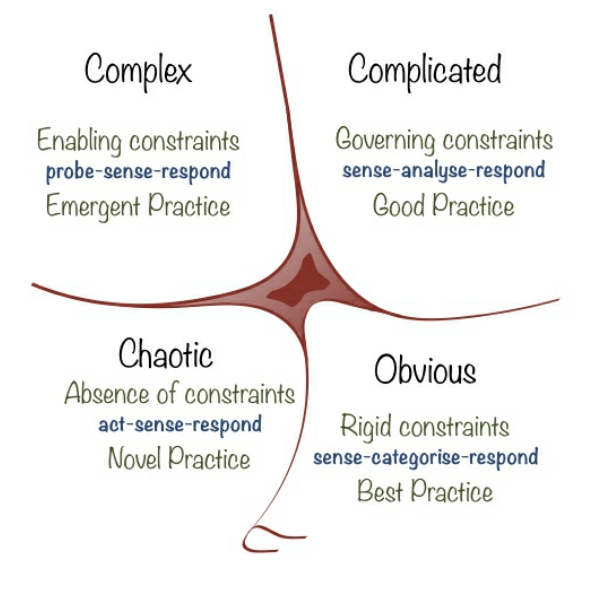Complexity
If a situation is complex, we can’t really know what causes which effect. Causation and effect are not tangible when things happen. The situation is not (fully) predictable. A complex situation is uncertain and ambiguous.
- Ambiquous because there can be many possible explanations.
- Uncertain because the outcome is not predictable.
A systems behavior emerges from the interaction of its components.
Cynefin
 Snowden, David J. and Mary E. Boone. A Leader’s Framework for Decision Making in Harvard Business Review, November 2007. The introductory article about the Cynefin Framework.
Snowden, David J. and Mary E. Boone. A Leader’s Framework for Decision Making in Harvard Business Review, November 2007. The introductory article about the Cynefin Framework.
Example - 2 human interaction
As we can’t fully access our own and the others intention and thoughts we don’t fully understand what is causing a behavior/ a response.
For ourself we are influenced by many factors, some conscious, many sub-conscious. So how we respond to something we sense goes through many layers and each layer add to our construction of our reality. The same happens for the other person.
So what causes a response can be input from many different sources.
The same way the effect of our response is not fully measurable when it affects another person. The other person might express their perception but might hide information (either conscious of subconscious). Also we do think we understand the others reaction, but again this connects to our own construction of our subjective reality.
Consequences
- Accidents are almost never the fault of a single person. Accidents typically emerge from a complex interplay of contributing factors.
- What experiments will you use to probe, to discover your unknowns?
Linking
- [[Company-wide Agility with Beyond Budgeting, Open Space & Sociocracy]]
- [[Accelerate]]
- Complex Adaptive System
- Great article about Cynefin and Simple, Complicated,Complex, Chaotic